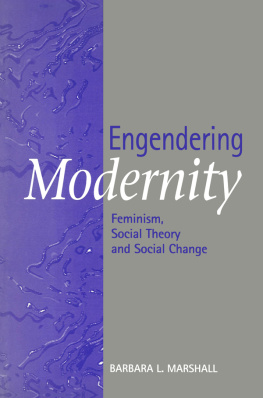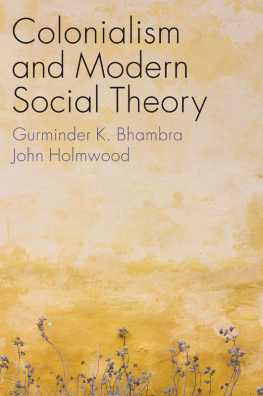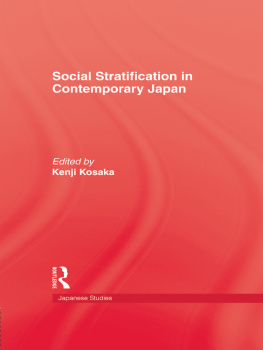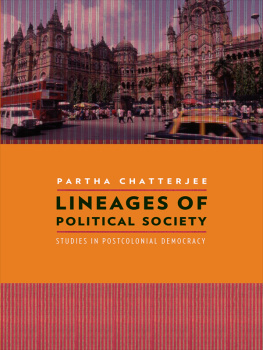DIFFERENCE AND MODERNITY
Japanese Studies
General Editor: Yoshio Sugimoto
Images of Japanese Society: Ross E. Mouer and Yoshio Sugimoto
An Intellectual History of Wartime Japan: Shunsuke Tsurumi
A Cultural History of Postwar Japan: Shunsuke Tsurumi
Beyond Computopia: Tessa Morris-Suzuki
Constructs for Understanding Japan: Yoshio Sugimoto and Ross E. Mouer
Japanese Models for Conflict Resolution: S. N. Eisenstadt and Eyal Ben-Ari
Changing Japanese Suburbia: Eyal Ben-Ari
The Rise of the Japanese Corporate System: Koji Matsumoto
Science, Technology and Society in Postwar Japan: Shigeru Nakayama
Group Psychology of the Japanese in Wartime: Toshio Iritani
Enterprise Unionism in Japan: Hirosuke Kawanishi
Social Psychology of Modern Japan: Munesuke Mita
The Origin of Ethnography in Japan: Minoru Kawada
Social Stratification in Contemporary Japan: Kenji Kosaka
Sociology and Society of Japan: Nozomu Kawamura
Diversity in Japanese Culture and Language: edited by John C. Maher and Gaynor Macdonald
Migrant Workers in Japan: Hiroshi Komai
Difference and Modernity: Social Theory and Contemporary
Japanese Society: John Clammer
DIFFERENCE AND MODERNITY
Social Theory and Contemporary Japanese Society
John Clammer
First published in 1995 by
Kegan Paul International
This edition first published in 2010 by
Routledge
2 Park Square, Milton Park, Abingdon, Oxon, 0X14 4RN
Simultaneously published in the USA and Canada
by Routledge
270 Madison Avenue, New York, NY 10016
Routledge is an imprint of the Taylor & Francis Group, an informa business
John Clammer 1995
Transferred to Digital Printing 2010
All rights reserved. No part of this book may be reprinted or reproduced or utilised in any form or by any electronic, mechanical, or other means, now known or hereafter invented, including photocopying and recording, or in any information storage or retrieval system, without permission in writing from the publishers.
British Library Cataloguing in Publication Data
A catalogue record for this book is available from the British Library
ISBN 10: 0-7103-0507-9 (hbk)
ISBN 13: 978-0-7103-0507-7 (hbk)
Publishers Note
The publisher has gone to great lengths to ensure the quality of this reprint but points out that some imperfections in the original copies may be apparent. The publisher has made every effort to contact original copyright holders and would welcome correspondence from those they have been unable to trace.
A Note on Names and Romanization
Japanese names are given in the indigenous fashion, i.e., the family name first followed by the given name, except in cases where an individual or author specifically adopts the alternative way of given name first.
Standard romanization of Japanese words have been used throughout and macrons to indicate long vowels have been avoided in those cases where the normal romanized spelling ignores them, thus Tokyo rather than T

k

y.
Acknowledgements
This book has benefitted from the comments of many friendly critics. I would especially like to mention Hirose Takeshi, who not only typed the manuscript but also provided constant feedback, advice on Japanese sources and an insiders perspective on the problems that I discuss; also Eric Schwimmer, who saw in the manuscript things that I had not seen myself. And, although they may not know it, many of my students in the Graduate Seminar and in my course on Theory and Method in Asian Studies at Sophia University have influenced the shape of this book through our debates and reading of texts together.
1 Introduction: Theorizing Japanese Society
This essay is not a work of empirical sociology: it is a study in social theory. Its intention is to examine the relevance of some major aspects and assumptions of contemporary social and cultural theory to one society that has a very different history and conception of its self-identity from the western ones in which the modem social sciences have almost exclusively arisen. The case study here is Japan, arguably the biggest challenge to the preoccupations and epistemology of much conventional sociological and cultural thinking. For in Japan we have the only major case of a non-western country that has undertaken an indigenous industrialization programme that has brought it to the front ranks of the modem developed capitalist societies, yet has done so on the basis of a very different history, social organization, set of cultural premises and ecological conditions, than its rivals.
The question of how this success (if so it be) has come about has provoked a variety of answers often including the ingredients of a particular confluence of historical, geographical and sociological factors such as Tokugawa isolationism, neo-Confucianism, location in temperate North-East Asia, lack of raw materials creating the necessity for diligence and harmonious work relationships, losing a war against the Americans and then, when finding oneself conveniently committed to a peace constitution, having the economically enormously beneficial Korean and Vietnam Wars breaking out almost on ones doorstep. Lying behind such specific explanations is a deeper methodological issue. Explanations of the internal workings of Japanese society and its achievement of modernity tend to fall into two main categories: political economy (including institutional factors) ones, or culturalist ones. Into the first category fall the arguments of analysists such as Chalmers Johnson (1987) and Karl Van Wolferen (1989), both of whom explicitly exclude consideration of culture as part of their framework, preferring instead to dwell primarily on sociological (for example, education backgrounds of top bureaucrats) and systemic (for example, the links between bureaucracy and big business) factors. Into the second category falls the now immense literature often collectively described as the Nihonjinron (Theories of the Japanese) which tends to exclude analysis of structural (economic, political or sociological) factors in favour of explanations based on ideas of cultural uniqueness. This literature includes both innumerable Japanese examples (for overviews in English, see Mouer and Sugimoto 1986 and Dale 1989) and ones in European languages the best known these being Ruth Benedicts celebrated The Chrysanthemum and the Sword (1989).
One of these paradigms explicitly excludes culture; the other sees little else. Stated thus, it is obvious that both are partial. But this very partiality raised a number of fundamental questions for social theorists, whether eastern or western, including those of the relationships between cultural analysis and political-economic analysis, of the universality of western theory as opposed to the particularity of Japanese theory, of appropriate methodologies for grasping the sociological distinctiveness of individual societies without forcing on them ethnocentric and ahistorical demands for uniformity and of the relationship between ideology and practice, between a societys conception of itself and the actual behaviour of its members. The empirical study of Japanese society throws up these questions in a particular acute way. Here we have a society of large scale that has been conspicuously successful in creating an industrial, technological and consumerist society, but which seems to defy many of the existing attempts to theorize it. Is it really capitalist or democratic? Or is it even modern? Perhaps it is really tribal or feudal sociologically while able somehow (or because of this) to manage technology in a uniquely efficient way? Is it a society of groups; organized in a vertical way that manages to deny the necessity of classes (Nakane 1973)? At whatever point one begins to approach the analysis of Japanese society it poses questions of this nature ones that can certainly be asked in terms of existing and essentially western social theory, but which are very difficult to answer using the vocabulary and epistemology that the available range of theoretical options makes available to us.









 k
k